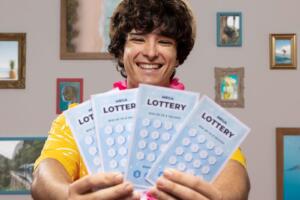Since breakout technologies like crypto, NFTs, and blockchain began to touch the popular conscience, fintech has been a hot topic. The rise of mobile payments and digital currencies is set to have a growing influence on activities such as grocery shopping, booking holidays, and playing the lottery. This article examines how fintech innovations changed New Zealand’s lottery payment ecosystem.
How will fintech grow in New Zealand in 2024?
Context is key when understanding the changes an industry is experiencing. The 2023 TIN survey revealed the scale of fintech in New Zealand, showing it as the fastest-growing tech sector, surpassing health tech with $2.6 billion in revenue. This growth has been consistent over the past decade, something we can see from the detailed analysis outlined in the NZ fintech report from 2024.
Here, we will focus on fintech innovations’ impact on the lottery payment system. While some argue that fintech should focus on emerging tech like crypto, it encompasses a broader range of advances. To understand this, we need to explore how the banking system now interacts with the traditional pay-to-play lottery in New Zealand.
How is fintech reshaping the interface between the lottery and the banking system?
Twenty years ago, lottery players would walk into their local store or supermarket, select their lucky numbers, and pay cash for their tickets. A decade ago, most players used cards for these purchases, eliminating the need to carry exact change or deal with physical currency. This shift is a prime example of fintech in action. But where are we headed next?
A deep analysis of fintech’s impact on the wider banking sector reveals four key drivers that will significantly influence the lottery’s payment system:
- Greater efficiency when it comes to payment processing times, thanks to a fully digital, platform-agnostic system that connects with all banking and finance houses. This allows the lottery to scale with no increase in processing times and no local restrictions on coverage.
- Increased access flows that bring a more inclusive and accessible lottery. This is evident from the lottery’s widespread advertising that anyone in New Zealand can participate and potentially win big.
- Higher security levels due to the multiple authentication and verification factors working in the payment ecosystem backend. This is good news for those concerned about the digitisation of an online lottery leading to blackouts, hacks or fraud. In fact, the ecosystem is now built on a level of security that far outstrips that of the traditional cash lottery we all took for granted around 20 years ago.
- Interoperability and merchant choice are two intertwined factors that naturally get grouped together. By offering a platform-agnostic approach that allows players to play with greater freedom when it comes to how they fund their tickets, the fintech advances employed here serve to help fuel increased jackpot sizes. There is also an added benefit: payouts to lucky winners are now much more fluid, streamlined and low-stress for the players themselves.
A recent Reserve Bank of New Zealand study supports this analysis and shows that change is accelerating. The key point to note here is that it is happening in a way that allows regulation to keep pace. Some aspects of fintech – the more deregulated sectors – have gained something of a bad name due to issues with FTX and Binance. They may have made headlines around the world, but they’re a long way disconnected from the fintech advances that are improving the lottery payment system in New Zealand.
Anyone looking to play the New Zealand lottery may have already spotted a shift that aligns with all of the above, particularly one that lends itself to a more democratically playable lottery. Greater access to secure online payment capabilities means that playing online is now easier than ever and is without any of the security concerns that often come with a rapid expansion and rollout to new playing methods. The trusted platform Betkiwi.co.nz has a wide selection of payment methods available to choose from and clearly categorises these so users can access what they need when they need to. From casinos to the lottery, the evolvement of these payment methods has made making payments online more efficient and secure. We believe the lottery has become truly democratic by accepting the widest range of payment functionalities.
What does financial democratisation mean for the lottery payment ecosystem?
We spoke with Dominic Greenholt, a New Zealand payment method expert with more than 10 years of experience in the gambling industry, who provided further insight:
“The trend towards multiple authentication and verification factors is something that has underwritten the risk of rapidly expanding the methods of payment. Whether the payments come from a traditional brick-and-mortar bank, a digital wallet, or via some form of distribution of capital from a peer-to-peer lending account, the security provisions in the backend continue to hold firm.
“Building an ecosystem is the natural next step from accepting a closed circle of particular online payments. While the latter can help expand the audience and get more people playing, it just isn’t scalable in the way that a fully evolved ecosystem is. Every new payment provider and source of online funding would have to be manually onboarded and security provisions made. The problem with this – other than the time constraints – is that security loopholes and grey areas inevitably emerge.
“A fully-fledged ecosystem, however, uses the scalability of digital verification and authentication to push lenders into a platform-agnostic direction: they all learn to interface with the Lottery’s payment systems in the same way. It’s this step change that broadens the audience while simultaneously tightening security.”
By removing barriers to entry while at the same time raising security standards, recent fintech advances have made playing online much more appealing. Not only is it easier to buy a ticket for a jackpot that now has the potential to be substantially bigger, but fintech allows an instant feedback loop:
- Winning tickets can be instantly highlighted, and payment can be made back into the account from which the original ticket was purchased.
- Full player ID checks are carried out during the funding of the ticket, meaning that payouts are now a much smoother, quicker process for all involved.
- Players have the peace of mind that comes from knowing they can check the status of their tickets at any time, without ever having to worry about losing a physical ticket.
This is a classic example of how multiple advances in a given industry can completely change how another operates.
Will playing the online lottery become increasingly common?
All signs indicate that the increased integration between fintech innovations and mobile devices will fuel even greater player numbers. Even at a time in which many are tightening their household budgets, the ease of use that arises from having the means to play from anywhere in the palm of your hand is significant. Fintech, which effectively powers the ecosystem and makes this possible, is the unsung hero in many ways and one that will continue to advance at scale.
Of particular note is the potential for wider interconnections with other funding and spending options, all of which are available from the smartphones we have by our side throughout the day.
Final thoughts
The future of New Zealand’s lottery payment ecosystem is bright, but it’s also built on a solid foundation of multi-factor authentication and verification. This means that there is certainly no bubble or bull rush in process here – the basics have been put in place so that everyone can benefit as a consequence.
It’s also good news for the many charitable causes and community projects that are funded by ticket purchases. For many years, New Zealanders have been able to wager they will strike it lucky, while at the same time guaranteeing that they will be able to give back to the places close to their heart, where they live their lives. Fintech advancements could lead to gaming operators rolling out other forms of integrated giving in the form of options that allow players to round up their stakes and give the extra to a good cause selected from a set list.





